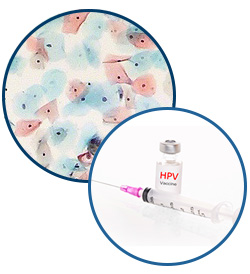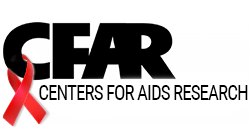URMC / Research / Immunity and Infection
Immunity and Infection Research
 Fighting Infections
Fighting Infections
Several widely used vaccines that have improved the health of people around the world are rooted in infectious disease research at URMC. Our scientists contributed technology that led to the HPV vaccine, which protects against cervical cancer. Newborns across the globe receive a vaccine that URMC researchers created against Haemophilus influenza type B (Hib) that has virtually wiped out a leading cause of meningitis in preschoolers. And we conducted the first pivotal study to show that large doses of a vaccine for the H5N1 bird flu virus are safe and effective. Largely as a result of this work, the vaccine is approved and ready to use should we face a pandemic.
Most vaccine studies take place at our Infectious Disease Research Center, which has designed and conducted trials of investigational vaccines to protect against norovirus, anthrax, herpes, malaria, and smallpox. We enroll individuals year-round to test the effectiveness of new vaccines for seasonal flu and established and emerging strains of bird flu.
The NIH-funded New York Influenza Center of Excellence at URMC studies how our immune systems respond to flu vaccines, with the long-term goal of creating vaccines that provide better protection. The prevention and treatment of infectious diseases that affect the lungs, such as bacterial pneumonia and respiratory syncytial virus (RSV), are the focus of URMC’s Respiratory Pathogens Research Center.
 The Medical Center also has a long history in HIV research, and was one of the first sites in the United States to conduct HIV vaccine studies. The NIH-sponsored University of Rochester HIV/AIDS Clinical Trials Unit, also known as the Rochester Victory Alliance, has participated in more than 275 HIV treatment and vaccine trials and enrolled upwards of 3,500 volunteers since 1987. This and other promising HIV research led the NIH to name the University a Center for AIDS Research (CFAR) in 2013. We are one of just 20 CFARs in the country, placing us among the best in the nation for research to improve the prevention, detection, and treatment of the disease.
The Medical Center also has a long history in HIV research, and was one of the first sites in the United States to conduct HIV vaccine studies. The NIH-sponsored University of Rochester HIV/AIDS Clinical Trials Unit, also known as the Rochester Victory Alliance, has participated in more than 275 HIV treatment and vaccine trials and enrolled upwards of 3,500 volunteers since 1987. This and other promising HIV research led the NIH to name the University a Center for AIDS Research (CFAR) in 2013. We are one of just 20 CFARs in the country, placing us among the best in the nation for research to improve the prevention, detection, and treatment of the disease.